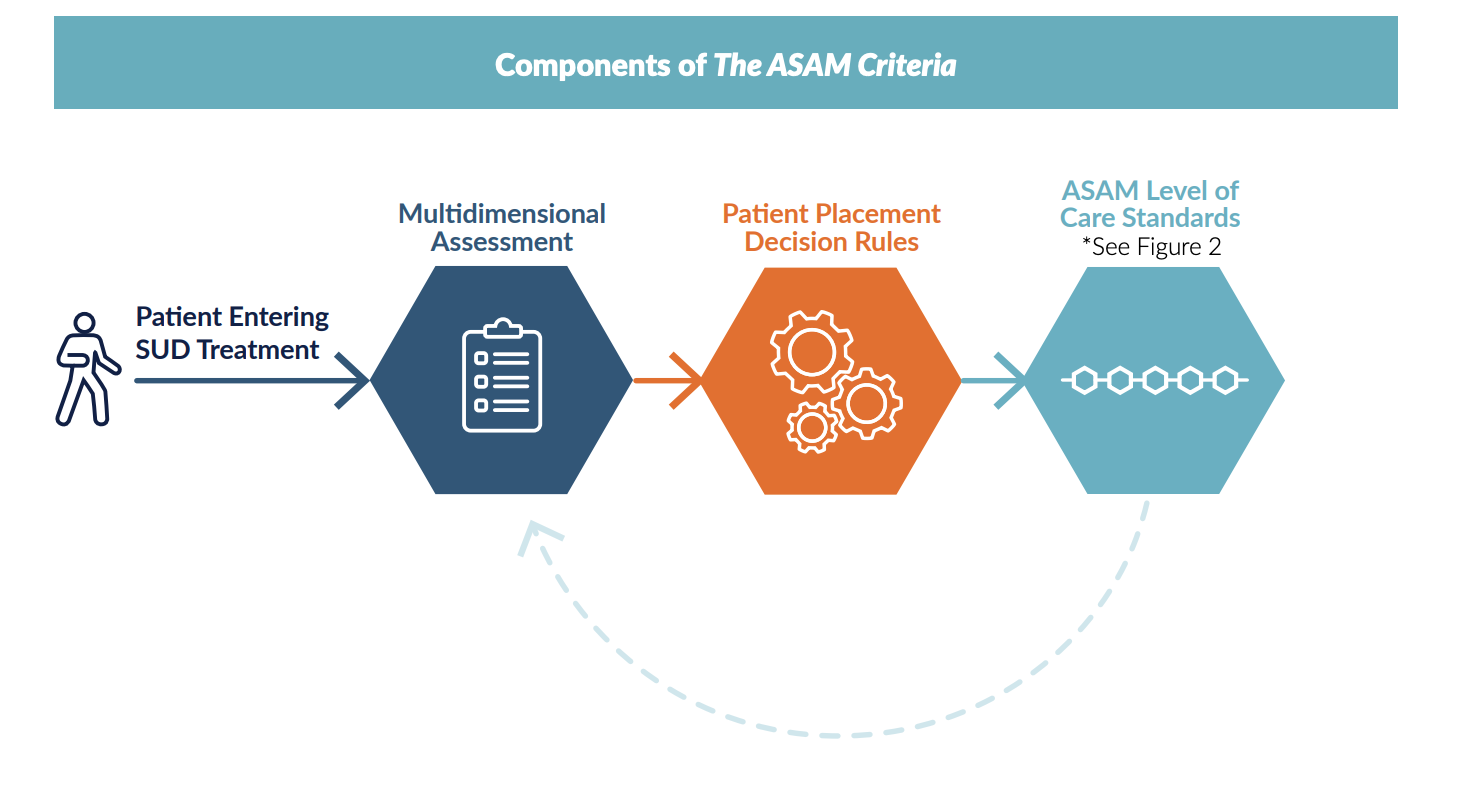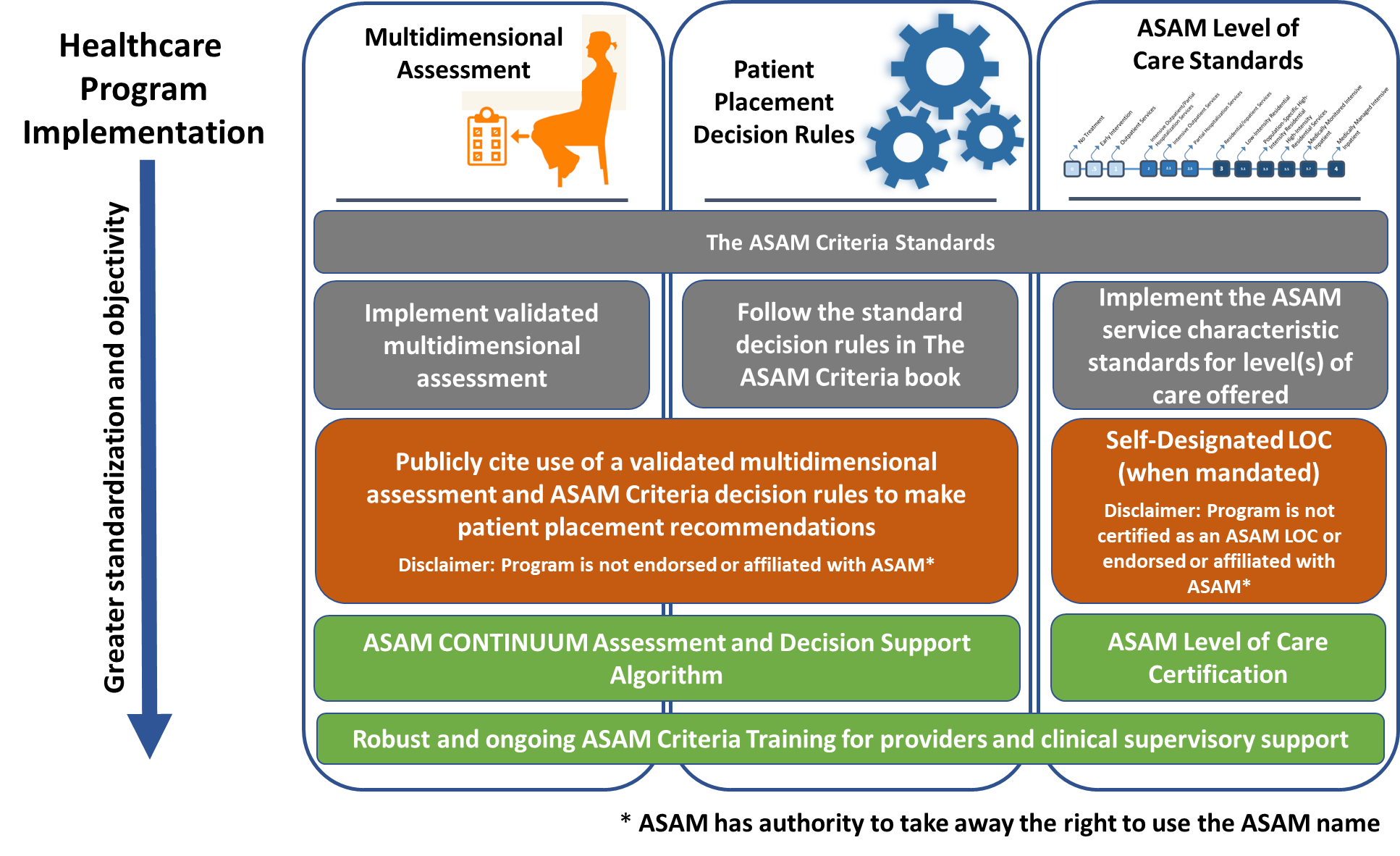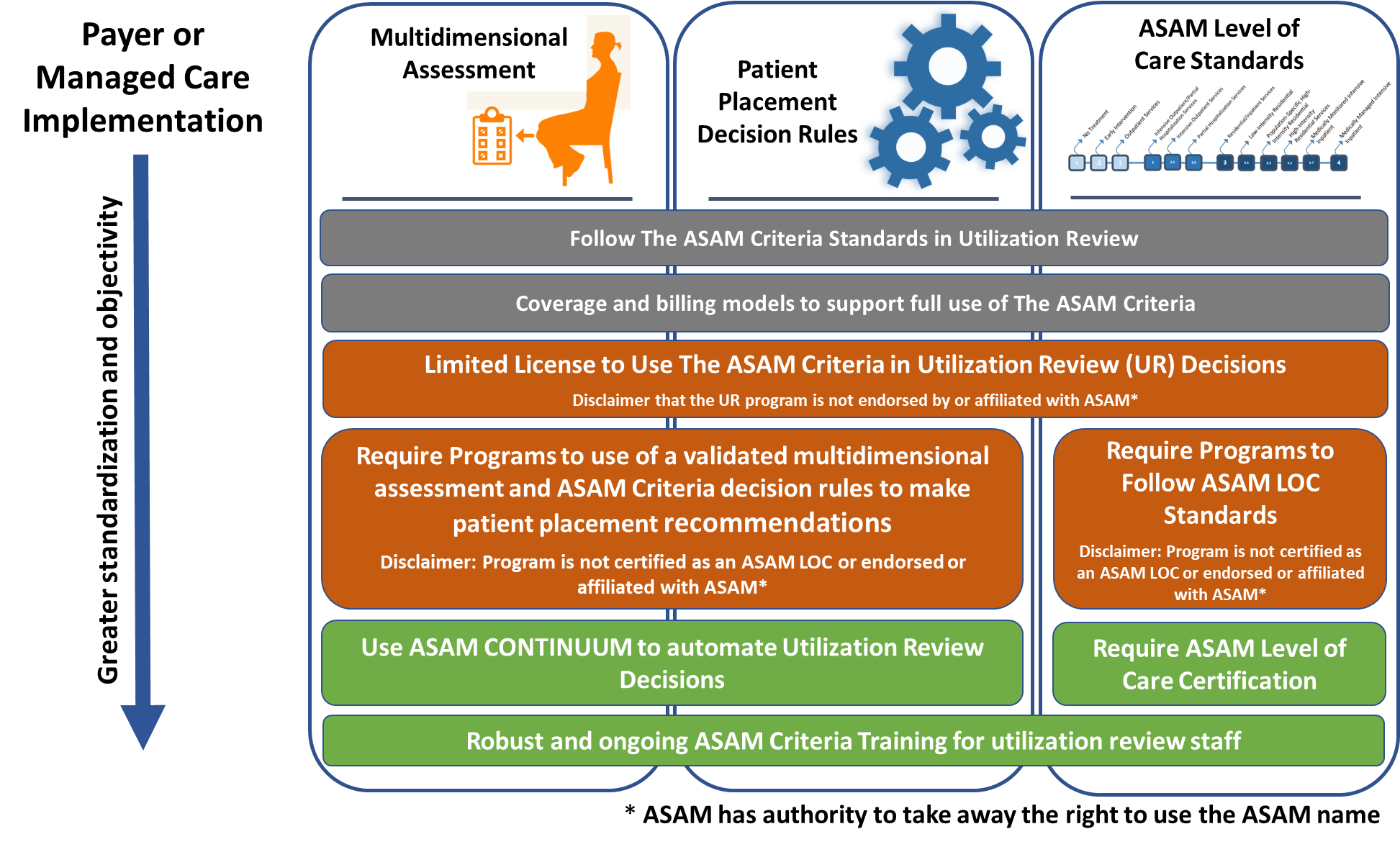Copyright & Permissions
Frequently Asked Questions
Copyright & Permission FAQs
Expand all
Questions? Please email ASAMcriteria@asam.org

Copyright & Permissions
Permission is required to:
ASAM strongly supports the expanded use of clinical standards of care, including The ASAM Criteria, throughout the addiction treatment system. Correct implementation of these standards is critical for effective treatment planning and care delivery.
Recent growth in use of The ASAM Criteria has been accompanied by increasing reports of misuse and unapproved use by some providers and payers. In some cases, parts of The ASAM Criteria standards are used but they are not implemented comprehensively. These actions threaten the long-term credibility and integrity of The ASAM Criteria and undermine the efforts of providers and payers who implement it correctly. ASAM has a responsibility – to providers, payers, regulators, patients and their families – to ensure The ASAM Criteria continues to be equated with high-quality care proven to be effective in addiction treatment.
To that end, ASAM is embarking on a number of modifications to The ASAM Criteria copyright permissions processes. This includes a permissions agreement process to authorize use of ASAM’s intellectual property with a disclaimer that helps avoid any confusion among patient, families, providers or payers. To learn more, visit the Criteria copyright permissions page.
The ASAM Criteria includes standards for multiple components of care, including: (1) a standardized multidimensional assessment; (2) standard decision rules for interpreting the multidimensional assessment and matching the patient to the right level of care to meet their treatment needs; and (3) standard service characteristics that define each level of care in the care continuum. These components all work in tandem to ensure that the patient is matched to the right level of care to meet their individual needs.

To fully implement The ASAM Criteria within the addiction treatment system all elements must be in place:
ASAM is working to provide tools to support comprehensive and effective implementation across all the components described in the previous question. For example:
These tools will help to support greater standardization and objectivity in the implementation of The ASAM Criteria by both healthcare providers and payers:


It will take time to build all the tools that are needed to robustly support implementation of The ASAM Criteria. In the short-term the copyright permissions process changes will help ASAM protect the integrity of The ASAM Criteria by:
In the longer-term the tools that are under development are a better way to support effective implementation of The ASAM Criteria. For example, the ASAM Level of Care certification program is ultimately a more effective way to ensure that a program has the capacity to deliver an ASAM Level of Care. However, it will take time to develop the certification programs for all levels of care and certify providers, and it is important for ASAM to take steps to protect the integrity of The ASAM Criteria in the meantime.
The following types of providers and care delivery organizations are eligible for permission to publish or market the use The ASAM Criteria:
Additionally, the following types of entities and organizations are eligible for permission to publish or market the use of The ASAM Criteria:
Permissions requests from other entities, individuals, or organizations will be evaluated on a case-by-case basis.
No. Providers do not need a permission agreement to implement The ASAM Criteria or to certify their compliance with relevant state requirements. However, a permission agreement is needed for any provider that wishes to market their use of The ASAM Criteria, or to otherwise use ASAM Criteria content or trademarks in connection with the sale, offering for sale, distribution, or advertising of any goods or services.
ASAM recognizes that these changes will be a transition for the field. We plan to use a phased approach, working with a few states at a time and modifying the program as necessary to address the nuances of individual states’ implementation of The ASAM Criteria and any unintended consequences of the updated permission process. ASAM will work in partnership with states and other public entities to find the balance for supporting states’ efforts to reform the addiction treatment system while protecting the integrity of The ASAM Criteria.
ASAM acknowledges uses for educational purposes to be within fair use and does not require a permissions agreement for such purposes. ASAM looks to existing copyright law to define an educational purpose to include material used in educational institutions and for educational purposes. Examples of educational institutions include K-12 schools, colleges, and universities. Libraries, museums, hospitals, and other public entities and nonprofit institutions also are considered educational institutions under most educational fair use guidelines when they engage in nonprofit instructional, research, or scholarly activities for educational purposes.
ASAM further defines educational purposes to include:
No. Public entities and providers do not need to obtain a permission agreement to sponsor basic introductory trainings to familiarize staff with the basic conceptual framework for The ASAM Criteria, ASAM multidimensional assessment, and/or ASAM levels of care. These types of trainings typically fall under the fair use guidelines and do not infringe upon ASAM copyrights. ASAM generally considers education or trainings to be fair use if they:
For individuals or organizations interested in obtaining permission to provide trainings on The ASAM Criteria that go beyond our fair use policy please contact ASAMCriteria@asam.org.
ASAM considers certain uses of, and references to, ASAM trademarks and copyrighted material in statutes, regulations, or other government policy documents to fall within the Fair Use doctrine and to be permissible without a permission agreement. (See ASAM’s Fair Use Guidelines) Similarly, ASAM considers limited uses by providers who reference their use of The ASAM Criteria for regulatory purposes and to the extent necessary to comply with the law to qualify as fair use. For example, providers do not need a permission agreement to implement The ASAM Criteria or to certify their compliance with relevant state requirements.
Click here for information on how to apply for a permissions agreement.
Complete to apply for a permissions agreement. For more information on types of permission agreements, visit the Permissions page.Permissions agreements for states and other public entities will be free of charge.
Permissions agreements for payers & managed care entities are based on the number of licenses requested and total covered lives.
Permissions agreements for training vendors: For ASAM designated training vendors (detailed here), rates will be determined based on the amount of content requested and intended scope of distribution. For individual, non-endorsed training vendors, permission agreements will be free of charge.
Permissions agreements for technology vendors: ASAM will review permission requests from technology vendors on a case-by-case basis. Rates will be determined based on the amount of content requested, scope of distribution, and other relevant factors.
Permissions agreements for reuse of ASAM Criteria content in publications (e.g., book, scholarly journals) will be priced based on type and amount of content being used and intended scope of distribution.
ASAM is rapidly working to develop a range of programs designed to support effective implementation of The ASAM Criteria, including:
The ASAM Level of Care Certification program administered by CARF International will be issued to programs that demonstrate that they have the capacity to deliver a specific ASAM Criteria level of care. Programs that achieve certification will be authorized to advertise that it offers the specific ASAM levels of care covered by its certification and to display the ASAM level of care certification seal at the facility.
Providers who receive an ASAM Level of Care Certification from CARF International will not need a permissions agreement to reference their ASAM Level of Care certification.
ASAM CONTINUUM and ASAM Criteria Navigator® customers will not need a permission agreement to reference their use of the software or The ASAM Criteria to make patient placement recommendations or medical necessity determinations.
More information about our copyright and permissions process can be found on the ASAM copyright and permissions webpage.
Expand all
Collapse all